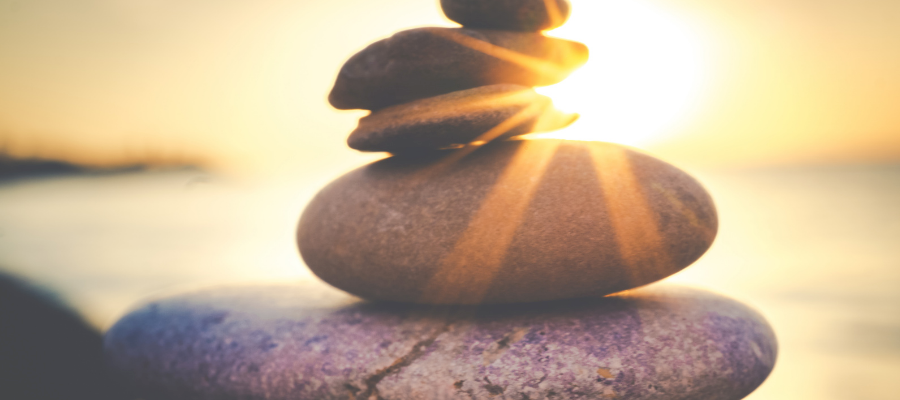|
Remember in your 20s and 30s when you thought you'd have it all figured out when you were older? Of course, you’ve learned a thing or two (or a million) along the way. But somehow finding balance still seems so out of reach. And, you're not alone. Finding balance is difficult. Partly because your idea of balance may look different than someone else's or your definition could change depending on what your life looks like. You achieve then you lose it and go back to square one. And when you get older, people think you have it all together and expect you to know exactly how to balance everything. You probably expect it too! The thing is, midlife can bring about some big transitions at or around the same time which can really throw off your balance. benefits of balanceBut before you jump in head first and try to rebalance yourself, you have to know what you’re aiming for. In general you might say “well, I just want to be able to do everything I need and want to do!” Well, duh, that would be quite the balancing act… And if you’re already doing that with no problems, kudos to you. I’m impressed! However, even when you’re technically “fitting everything in” it might be a good idea to ask yourself how you’re feeling. This is probably a good way to gauge if you actually feel balanced or if you’re simply making it work. When you’re balanced your mood is better, you’re happier, you’re physically and emotionally healthier, you don’t sweat the small stuff and feel you can cope with stress healthily. You’re able to handle things better, make time for yourself, and feel more accomplished in life. So check in with yourself. How’s your mood, energy, happiness and stress level? Do you only feel balanced when things are going well? Are you doing just what you need to do or are you making time for your desires and goals as well? If any of these things are setting alarm bells off in your head, you may be a little out of balance. Whether you’re in a complete balance crisis or simply want to make a few changes to stay on track, it’s a good idea to understand why you might be feeling this way. Related Post- Off The Back Burner: Weight Loss, Exercise & Me Time why midlife?According to research, women in their midlife (around ages 45-65) deal with more stressors than younger or older women. This is usually because multiple stressful situations and transitions are happening at or around the same time. A women’s health study found women in their midlife dealing with all sorts of problems colliding at once, ranging from:
The overall theme the study found was that midlife women are “searching for balance in the midst of co-occurring stressors while coping with losses and transitions.” When you deal with prolonged stress, your hormones respond. Stress hormones (cortisol, epinephrine) increase and can have some serious effects on your body; such as weight gain, increased belly fat, sleep and digestive problems and increase the risk of heart disease or stroke. So let’s talk about some ways to destress and start gaining more balance! 8 ways to balance your life#1: Keep A Journal Sometimes you just need to let it all out! And sometimes you don’t have the right environment to do that. Or there are things you’re dealing with that you don’t want to share at the moment. Journaling is a great way to cope with stressful situations. Try using journal prompts if you have trouble getting started. You’d be surprised what will come out when you simply let yourself write and stop holding it all inside. It’s a great way to stop stress and concerns from immobilizing you.
#2 Check Your Coping Skills When you have healthy coping skills, you can keep your moods level. It helps you stay calm even while problems are arising. If you turn to unhealthy activities all the time to cope with what’s happening in life, they can become problematic and hold you back. #3 Let People Solve Their Own Problems I know. How could you? What if they do it wrong? Ask yourself what you can realistically do though. If you say yes to everyone who needs help or needs something from you it will interfere with everything you already need to do. And if you are caring for someone in crisis or with declining health, you need to make sure you reserve your energy. Solving everyone’s problems is not an option and will end up leaving no time to care for yourself. #4 Let Go Of Control This is a tough one. Especially when you wear so many different hats. But when a problem arises, try asking yourself if this is something you have control over or not? If the answer is no, let it go. Practice a healthy coping skill like taking a walk, setting healthy boundaries or talking to a trusted friend or even a therapist. When you try to control problems you have no control over, the problem stays the same, but you drain yourself. #5 Don’t Panic This does not refer to a panic or anxiety disorder. For those, simply saying “don’t panic” is not realistic or helpful. However, we all panic at times in life when we react to difficult situations or circumstances. Panic is completely normal and nothing to be ashamed of, but it often leads to poor problem solving and even more emotional distress. Keep that in mind and practice telling yourself not to panic when stress or overwhelm or overload pop up in your life. This helps you stay in the solution, keep your sanity and save you LOTS of time from worrying about what could happen. #6 Gratitude Being thankful is something we often think we’re doing, but don’t practice enough. It’s hard to be thankful all the time, especially when things are going poorly or you feel like you’re at the end of your rope, but that’s the best time to do it. Gratitude is grounding and humbling. It calms you and allows you to see the bigger picture. You may not love what you’re experiencing, but finding gratitude in the good things around you or even for the difficult situation helps keep your feet on the ground and maintain balance. #7 Listen To Your Body Your body will tell you a lot if you take time to hear it. Feeling tired or weak? Are you getting aches and pains constantly? Maybe you’re not eating enough or getting the right nutrients. Maybe you need to stretch or take some walks during the day. Or maybe your stress levels are too high and it’s showing up in your body. If you don’t take the time to maintain balance and take care of yourself, your body will make you pay attention eventually. And keeping your body healthy will certainly help you keep everything else in your life healthy and running smoothly! #8 Ask For Help There can be a lot of shame in asking for help. Why couldn’t I do it alone? Other people figure it out, why can’t I? I don’t have time to ask for help. I don’t want to spend money on paying for professional help when it could go to something more important! A lot of the resistance to ask for help comes from a baseline belief that you are not worth the help. Maybe you think that’s crazy because you are confident and you know you need to take care of yourself. Asking for help, whether it’s from a friend or family member, a doctor, a therapist, a coach, a spiritual guidance or even a stranger is a courageous act that can be greatly beneficial. Trying to do it all yourself may cost more than it’s worth at times. Your life will continually change and evolve. New problems, new joys, new circumstances will arise and you will search for balance again. By remembering the benefits of balance you will always strive for it. By remembering which phase of life you’re in, you can look to others and remember you are not alone. And by following these tips, you can start to prepare for balancing and rebalancing whenever necessary. The key to balance is to remember everything will always become unbalanced without a solid foundation.
13 Comments
1/24/2022 05:37:37 am
Very much appreciated. Thank you for this excellent article. Keep posting!
Reply
10/18/2022 08:03:22 pm
Awesome article! This is certainly one of the best, most convenient, and most informative articles I've ever read. I'm excited to do some research and use the resources you've provided. Kudos!
Reply
1/25/2023 10:00:49 am
I maintain the "Don’t Panic" rule very well and will try maintain others as well.
Reply
7/10/2023 04:49:11 pm
I understand that finding balance in life can be a challenging endeavor for many individuals. The notion of balance can indeed vary from person to person and can evolve as circumstances change. It's common to experience fluctuations in one's sense of balance and to feel like you're starting over at times. Remember that balance is a subjective and ongoing pursuit, and it's important to adapt and adjust as you navigate through life's complexities. If there's anything specific you'd like assistance with, please let me know, and I'll do my best to provide information or guidance.
Reply
10/29/2023 05:21:02 pm
Great tips for finding balance during midlife and improving health! How do you prioritize self-care in your daily routine?
Reply
11/7/2023 12:12:29 am
Great insights on finding balance during midlife and improving health. How have these tips worked for you?
Reply
3/16/2024 04:09:25 pm
Realmente me gustó mucho este artículo. Hay muchos beneficios para mí.
Reply
3/18/2024 07:41:16 am
This article has great benefits for me. Thank you very much admin!
Reply
3/18/2024 07:43:21 am
I need to say thank you. Still i am reading this article. And i will read second time. Thanks for your attention.
Reply
Leave a Reply. |
authorLisa Swanson is an ACE Certified Health Coach, Personal Trainer and Orthopedic Exercise Specialist as well as a certified AASDN and PN level 1 nutritionist. With over 35 years experience helping people turn their lives around, she is on a mission to provide relevant and useful knowledge to help women in midlife reach their goals. featured onCheck out my interview with the Magnificent Midlife podcast on staying fit and healthy long-term.
Categories
All
|
What I DoAt Body & Soul Coaching I empower women over 50 to lose weight and feel confident without deprivation diets or spending hours in the gym.
|
Company |
|
|
© COPYRIGHT 2022. ALL RIGHTS RESERVED.
|
Website Design by My Personal Trainer Website
|



 RSS Feed
RSS Feed